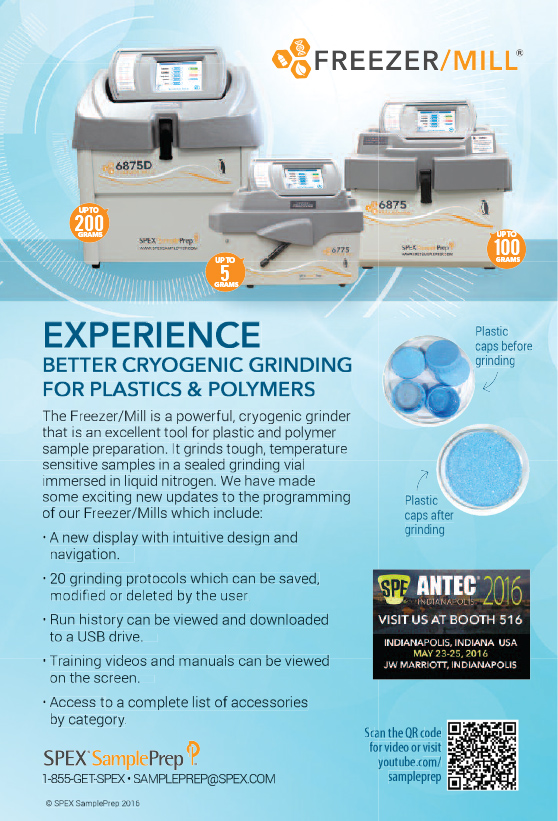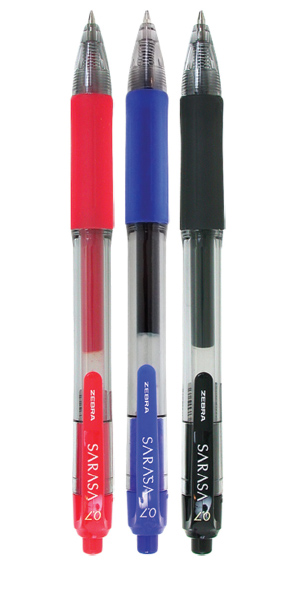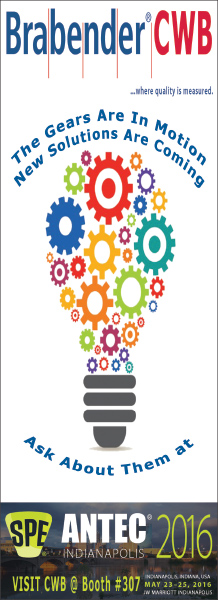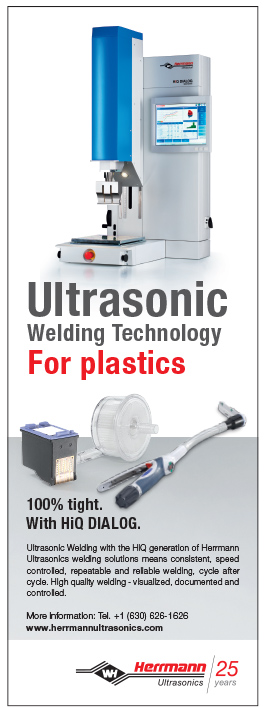
Photo courtesy of EVCO Plastics



Photo courtesy of Krailburg TPE

Photo courtesy of Solvay Specialty Polymers


Photo courtesy of Butler Automatic

William L. Sheehan
Honored Processor: “Hire for Attitude—Train for Knowledge”
EVCO Plastics, a leading custom plastics manufacturer, was awarded the Plastics News 2015 Processor of the Year award. EVCO’s win comes in the 20th year that the award has been issued; it honors companies who exemplify superior achievement within their organization, community, and industry.
To qualify for this award, the company must be a manufacturer that forms finished plastics parts, such as detergent bottles or DVD cases. Nominated companies were required to submit a complete entry application; judges then reviewed the nominees’ applications before narrowing them down to the final four candidates. Submissions were based on the following criteria: quality, customer relations, technological innovation, industry/public service, employee relations, environmental performance, and financial performance.
“We are extremely excited and honored to have received this award,” says Dale Evans, president of EVCO Plastics. “Our successes over the last year wouldn’t have been nearly as robust if we took for granted our passion for quality and innovation, our desire for continuous improvement, and our staff—the people who make it all possible. Combined, these elements ensure our customers are priority one from day one, and this award is a great manifestation of those core beliefs.”
Regarding his staff, Evans says the company’s “hire for attitude—train for knowledge” approach has helped him find employees with the needed personality traits for their particular jobs. A commercial profiling system allows EVCO to find the right kind of person for each job, and shows what he or she specifically needs on the job to do it well. Picking the right people and allowing them opportunities to grow within the company’s environment prevents the loss of good workers, he explains.
Meanwhile, SPE has provided a number of free SPE memberships for companies that win Processor of the Year. Evans says he himself has been a member for 33 years (encouraged by his father, the company’s founder, who became a member in 1968). Evans has attended SPE conferences and gained knowledge in the field that way, and he stresses the importance of being part of a professional society (and reading its magazine, he adds).
During this month’s American Coatings Show 2016, Sun Chemical’s Performance Pigments and Advanced Materials divisions are introducing a variety of resins (based on technologies from its parent company, DIC) and pigments which will expand its waterborne offerings for architectural, industrial, and automotive coatings applications.
For premium mirror-like coatings, Sun’s Benda-Lutz® Splendal line offers four unique, microscopically thin aluminum platelet suspensions produced via physical vapor deposition. These vacuum metallized pigments range from a brilliant clean “white” to intense dark chrome reflections and are available in multiple solvents for almost every coating application. The Splendal pigment range finds applications in premium consumer electronics, automotive interiors, and automotive wheels.
Splendal vacuum metallized flakes can be formulated with Sun Chemical’s acrylic resins to produce luxurious finishes for plastics which meet the most demanding chemical-resistance specifications for automotive interiors. A solvent-borne acrylic polyol, the company’s WPU-349, reportedly exhibits outstanding adhesion to ABS and polycarbonate, and reportedly provides automotive interior coatings with superior sunscreen resistance.
In response to market demand for a pressure-sensitive adhesive (PSA) designed to replace mechanical fasteners, reduce component weight, and act as an assembly aid in manufacturing applications, Mactac Technical Tapes Products claims to have set a new precedent with its High-Strength Rubber Transfer Adhesive.
With a specially formulated, proprietary construction, the durable adhesive is designed to bond to a wide variety of materials and surfaces, including low-energy surfaces like polyethylene and polypropylene, as well as those that are uneven or irregular. Unlike liquid alternatives, Mactac’s rubber-based adhesive delivers immediate bonding with less cleanup and waste, the company says. As an added benefit, the high-strength adhesive can be applied without special equipment, reducing customer labor costs, increasing production assembly efficiency, and delivering a notable return on investment.
“PSAs have always had a prominent place in the fastening and assembly markets; however, most are unable to cost-effectively deliver the strong, permanent bond many applications in these demanding markets require,” says Janet Page, marketing manager, Mactac Performance Adhesives Group.
“By leveraging our nearly 60 years of PSA development experience and expertise, we were able to formulate a permanent adhesive solution that combines instant, aggressive tack and peel with superior shear strength—attributes that give our customers countless new, less-expensive possibilities for permanent bonding applications.”
Available in thicknesses of 5 to 50 mils (0.13-1.3 mm) and widths of 0.5 to 11.5 inches (1.3-29.2 cm), Mactac’s High-Strength Rubber Transfer Adhesive comes in self-wound rolls produced with easy-to-apply lift tabs. The adhesive is ideal for use with metal, wood, glass, rigid composites, extruded polymers and many other substrates, the company says.
Late last year, Kraiburg TPE Americas, manufacturer of tailor-made thermoplastic elastomers, received the 2014-2015 Best International Supplier Award from Zebra Pen, a producer of writing instruments in Monterrey, Mexico. Alberto Oba, director of Kraiburg TPE Mexico, accepted the award on the company’s behalf. It was given based on outstanding service, consistent product quality, and competitive pricing.
Kraiburg TPE Americas and Zebra Pen have been collaborating since February 2014, when their respective representatives initially met at Plastimagen, a national plastics exhibition in Mexico City. One of Kraiburg TPE America’s custom technologies from its Thermolast® K series was the solution for the grips needed on two of Zebra Pen’s product lines, the Orbitz and Sarasa.
For their Sarasa Gel Pen grip, Zebra was seeking a TPE with a high coefficient of friction and optimal adhesion to polypropylene, and one that would be easily pigmented to match the company’s array of ink colors. The material processing and physical properties aligned extremely well with this application. Because of this success, Zebra then decided to use the same grade for its Orbitz pen line.
Similarly, the custom TPE manufacturer aided in the optimization of Zebra’s logistics. Before partnering with Kraiburg TPE, Zebra was purchasing TPE overseas, resulting in a higher cost to acquire and store material. The thermoplastic elastomer producer reportedly not only provided a quality product that fit Zebra’s application requirements, but was able to streamline its supply chain to a more cost-efficient level.
With the addition of Solvay Specialty Polymers’ KetaSpire® polyetheretherketone (PEEK) polymer food-contact grades (which meet both U.S. Food & Drug Administration and EU Commission 10/2011 regulations), Austria-based Zell-Metall GmbH, a manufacturer of extruded engineering plastic stock shapes, has enhanced its Zellamid® 1500 PEEK product line. It says it now offers customers further distinct performance advantages when compared to standard PEEK products.
“Our new Zellamid 1500 X grade of stock shapes and semi-finished products, based on Solvay’s KetaSpire PEEK, successfully passed migration testing for food-contact materials according to EN 1186:2002 and EU 10/2011,” states Hans Winterleitner, international sales manager at Zell-Metall. “Solvay assisted us a great deal during this process by supplying the food- and potable water-contact certification documents for KetaSpire PEEK to help speed up the testing and approval process of our Zellamid 1500 X product.”
According to Art Tigera, product manager at Solvay Specialty Polymers, “KetaSpire PEEK food-contact grades offer distinct performance advantages that stem from Solvay’s state-of-the-art polymer production technology. It is a highly chemical resistant and exceptionally strong ultra-high performance polymer designed to replace stainless steel in domestic food processing machines.”
Not all commercial PEEK products deliver the same level of performance; depending on the grade, KetaSpire PEEK offers better fatigue resistance, 20% higher impact strength, and up to 60% higher ductility. A high-purity polymer, it reportedly retains excellent mechanical properties at continuous-use temperatures up to 120°C.
Winterleitner goes on to say, “At Zell-Metall we adopt a constant research and development strategy to improve our established Zellamid brand to offer higher-performance value-added products. Solvay’s KetaSpire PEEK is characterized by outstanding wear and abrasion resistance combined with high surface hardness, best-in-class fatigue performance, and excellent chemical resistance. This enables us to offer our customers problem-free machining and reprocessing of our semi-finished stock shapes for more challenging end-use food-contact applications such as gear wheels, bushings, and housings.”
The 1500 X food-contact product reportedly is available in 30% glass-filled and carbon-fiber reinforced grades.
www.solvayspecialtypolymers.com
Integral Technologies, Inc. and its subsidiary ElectriPlast Corp. have announced that its Asian molding partner, Chang Rim Inc., completed its initial delivery of a mobile consumer device with a first run of 3,000 units shipped to its customer.
“We have been working closely with Chang Rim on the material formulation to optimize performance and reduce cost,” says Doug Bathauer, Integral’s CEO.
“We are at work with our Korean manufacturer, Hanwha Advanced Materials, to ensure that we have the local manufacturing capacity in place to support Chang Rim’s anticipated demand for their automotive and mobile device projects.” (See also p. 26 of the February 2016 issue of Plastics Engineering.)
Chang Rim’s yearly demand is expected to be 50 tons for the mobile device application. The company is a specialty molder based in Daegu, South Korea, focusing on high-margin injection-molded products for a variety of industries including automotive, consumer, and industrial.
Butler Automatic, inventor of and leader in automatic splicing solutions, has introduced its new SP3HSL Series Automatic Film Splicer. The automatic web splicing system for printed sleeve films reportedly will increase line efficiency in sleeved packaging operations by eliminating film-roll change downtime.
Film-roll changes must occur in shrink-sleeve packaging applications as frequently as once every 18 minutes, and changing the roll by hand wastes one to three minutes of production time. By incorporating the SP3 automatic sleeve splicer, roll change time is eliminated, thereby increasing line efficiency.
“This product was originally developed to solve an efficiency problem for one key customer of Butler Automatic,” says Mike Mucci, vice president of engineering at Butler Automatic. “This particular customer will increase line efficiency by 9%, leading to a payback on their investment of less three months.”
Capable of running at speeds of up to 450 feet per minute (137 m/min.), the SP3HSL automatically splices the end of each expiring roll of film onto the new roll. The technology is ideally suited for increasing production time in consumer packaged goods and pharmaceutical applications utilizing shrink-sleeve packaging. The splicer will be sold both through OEM machine builders for new production lines, and for retro-fit installation on existing packaging lines, the company adds.
Metabolix, Inc., an advanced biomaterials company focused on sustainable solutions for the plastics industry, announced that it has signed a 10.5-year lease agreement for 30,000 square feet (2800 m2) of state-of-the-art laboratory and office space in Woburn, Massachusetts, USA. Metabolix expects to take occupancy of the space as its corporate headquarters in June 2016 as it exits space in Cambridge, Massachusetts.
“Access to the vibrant biotechnology community of Greater Boston was an important factor in evaluating re-location options,” says Joseph Shaulson, president and CEO of Metabolix. “With the new space in Woburn, we will be able to upgrade and expand our biopolymer applications development lab to support customer projects as we continue to ramp up our PHA [polyhydroxyalkanoate] biopolymer market development activities and work to transition from pilot scale to commercial scale operations.
“The move also allows us to reduce our overall footprint as we consolidate our Massachusetts operations … and significantly reduce facilities-related leasing and operating costs starting in 2017.”
Metabolix also plans to exit office space it currently occupies in Lowell, Massachusetts, in May, 2017, consolidating its biopolymer sales and marketing and administrative offices and R&D laboratories in the new Woburn facility. The new laboratory facilities reportedly will include a microbial fermentation lab and an expanded biopolymer applications development lab.
SPE has appointed strategic growth veteran William L. Sheehan to head its Strategic Business Development department. Sheehan will be responsible for identifying new commercial strategies in order to grow SPE’s non-dues revenues.
“Bill brings 20-plus years of senior executive experience with trade associations and technology companies,” says Russell C. Broome, SPE managing director. “He will play a key role in SPE’s mission of growing commercial strategy for non-dues revenue and taking it the next level.”
Sheehan has served in a senior executive capacity for the National Confectioners Association and the Snack Food Association and has also worked with several association services companies, including Naylor Association Solutions, SmithBucklin, and Multiview. He has exceptional knowledge in helping associations initiate programs to improve business relationships between their membership and their customers, to help associations increase and sustain member engagement and non-dues revenue.



